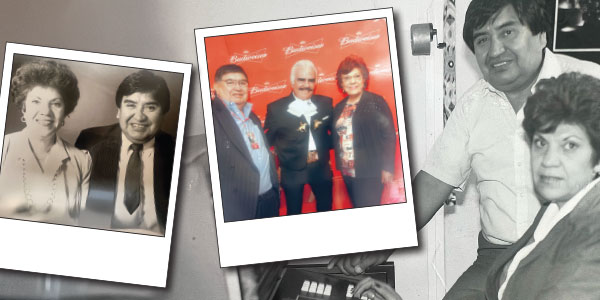
La enfermedad de Alzheimer afecta a más del seis por ciento de la población en Estados Unidos. Unos 5 millones o más de americanos están viviendo con la enfermedad; otros más de 15 millones están cuidando a alguien que padece la enfermedad, lo reporta la Asociación de Alzheimer. A pesar de su prevalencia, persisten los mitos y los conceptos equivocados y una falta de entendimiento en general sobre la enfermedad
El neurólogo Stanley Fisher está trabajando para hacer un cambio en ese aspecto. Él es subdirector del Instituto de Neurociencia Marion Bloch de Saint Luke, el cual está patrocinando “Brain: The Inside Story” (El cerebro: la historia interior). La exposición que viaja, está en exhibición hasta el 5 de septiembre en el museo Prairiefire en Overland Park. Fisher ha hecho dos presentaciones en conjunto con la exposición interactiva. La primera, “Losing Yourself: A Caregiver’s Guide to Dementia” (Perdiéndote tú mismo: una guía del cuidador para la demencia), fue el 6 de mayo; la segunda, “How to Preserve Your Brain” (cómo conservar tu cerebro) tomó lugar el 12 de agosto.
Para el público en general, Fisher ofrece una guía rápida sobre Alzheimer. Fisher empieza por definir los términos utilizados comúnmente, pero de manera incorrecta: la demencia y Alzheimer.
«La demencia no es un diagnóstico, ni es una enfermedad, es un conjunto de síntomas asociados con el declive en la memoria, personalidad, lenguaje, razonamiento. Una variedad de enfermedades pueden causar la demencia, e incluso una mayor variedad de enfermedades pueden causar la pérdida de la memoria”.
Alzheimer es una enfermedad progresiva del cerebro que se empeora con el tiempo, destruyendo la memoria y las capacidades de pensamiento y gradualmente con la capacidad de llevar a cabo una conversación o responder al ambiente. La edad es el factor de mayor riesgo. La mayor parte de las personas con Alzheimer son mayores de 65 años; sólo aproximadamente el cinco por ciento están entre 40 y 50 años de edad.
Alzheimer representa hasta el 80 por ciento de los casos de demencia, seguidos por demencia vascular, la cual ocurre después de un derrame cerebral, y la enfermedad de Parkinson, enfermedad de Huntington, encefalopatía traumática crónica, demencia con cuerpos de Lewy y media docena de otras.
Aunque tener dificultad con la memoria no significa necesariamente demencia, dijo Fisher, es importante determinar la causa.
«Busque ayuda para usted o su ser querido con un especialista en la memoria. Asegúrese que la persona que lo ayude sea un experto en el campo. Los neurólogos se consideran especialistas en trastornos de la memoria, pero yo hablo del subgrupo de neurólogos que se especializan en enfermedades neurodegenerativas. Tenemos ese tipo de expertos en Kansas City; no hay absolutamente ninguna razón para no buscar ayuda.
Alzheimer o una enfermedad relacionada no es la única causa de deterioro de la memoria. Un número de condiciones y trastornos pueden causar la pérdida de la memoria. Ellos incluyen depresión, ansiedad, azúcar baja en la sangre o baja presión sanguínea, alcoholismo, hipotiroidismo, tumor cerebral, deficiencia de vitamina B 12, insuficiencia renal, daño al hígado y más.
Existen causas reversibles de la demencia que deben descartarse. Es por eso que es muy importante buscar ayuda con especialistas de la memoria. Obtenga un diagnóstico definitivo si es posible. Eso es lo que hacemos en Saint Luke. Tenemos un equipo de especialidades múltiples, incluyendo neuropsicólogos, neurocirujanos y otros expertos».
La enfermedad de Alzheimer se desarrolla y se empeora con el tiempo. La velocidad de la progresión varía. Las personas con Alzheimer pueden sobrevivir hasta 20 años, de acuerdo con la Asociación de Alzheimer, pero el promedio es de 8 a 10 años, dijo Fisher.
«Depende de otras condiciones como el fumar, hipertensión, alto colesterol, consumo excesivo de alcohol, diabetes y enfermedad cardiaca. Todo eso aumentan el riesgo de desarrollar Alzheimer», dijo él. «Y si estás súper educado y tienes ejercicio mental de toda la vida, tienes una mayor reserva cognitiva».
Mantener un cuerpo saludable es crucial para la salud del cerebro
«Recuerde, su salud está pegada a su cuerpo», dijo él.
No existe actualmente una cura para Alzheimer, pero Fisher se sintió motivado después de asistir a la Conferencia Internacional de la Asociación de Alzheimer el mes pasado.
«No he visto tanto entusiasmo y energía en la investigación de Alzheimer en décadas. Por primera vez en mi carrera, siento que hay esperanza en el horizonte y me siento optimista».
__________________________________________________________________________________________________________________
Saint Luke’s researcher: intro to Alzheimer’s
By Edie R. Lambert
Alzheimer’s is a disease that affects more than six percent of the U.S. population. Some five million or more Americans are living with the disease; another 15-plus million are caring for someone with Alzheimer’s, reports the Alzheimer’s Association. Despite its prevalence, myths, misconceptions and a general lack of understanding about the disease persist.
Neurologist Stanley Fisher is working to change that. He’s co-director of Saint Luke’s Marion Bloch Neuroscience Institute, which is sponsoring “Brain: The Inside Story.” The traveling exhibit runs through Sept. 5 at the Museum at Prairiefire in Overland Park. Fisher has made two presentations in conjunction with the interactive exhibit. The first, “Losing Yourself: A Caregiver’s Guide to Dementia” occurred May 6; the second, “How to Preserve Your Brain” took place Aug. 12.
For the general public, Fisher offers a quick primer on Alzheimer’s. He begins by defining terms commonly but incorrectly used interchangeably: dementia and Alzheimer’s.
“Dementia is not a diagnosis, not a disease. It’s a set of symptoms associated with decline in memory, personality, language, reasoning,” he said. “A variety of diseases can cause dementia, and an even bigger variety of diseases can cause memory loss.”
Alzheimer’s is a progressive disease of the brain that worsens over time, destroying memory and thinking skills and eventually the ability to carry on a conversation or respond to the environment. Age is the greatest risk factor. Most people with Alzheimer’s are age 65 or older; only about five percent are in their 40s and 50s.
Alzheimer’s accounts for up to 80 percent of dementia cases, followed by vascular dementia, which occurs after a stroke, and Parkinson’s disease, Huntington’s disease, chronic traumatic encephalopathy, dementia with Lewy bodies and a half-dozen others.
While difficulty with memory doesn’t necessarily mean dementia, Fisher said, it’s critical to determine the cause.
“Seek help for (yourself or) your loved one from a memory specialist. Make sure the person helping you is an expert in the field,” he said. “Neurologists are considered memory disorder specialists, but I mean the subgroup of neurologists who specialize in neurodegenerative diseases. We have those experts in Kansas City; there’s absolutely no reason not to seek their help.”
Alzheimer’s or a related disease isn’t the only cause of memory impairment. A number of conditions and disorders can cause memory loss. They include depression, anxiety, low blood sugar or blood pressure, alcoholism, hypothyroidism, brain tumor, vitamin B12 deficiency, kidney failure, liver damage and more.
“There are reversible causes of dementia that must be ruled out,” Fisher said. “That’s why it’s so important to seek help from memory specialists. Get a definitive diagnosis, if possible. That’s what we do at Saint Luke’s. We have a multispecialty team, including neuropsychologists, neurosurgeons and other experts. ”
Alzheimer’s develops and worsens over time. The rate of progression varies. People with Alzheimer’s can survive up to 20 years, according to the Alzheimer’s Association, but the average is eight to 10 years, Fisher said.
“It depends on co-morbidities like smoking, hypertension, high cholesterol, excessive alcohol intake, diabetes and heart disease. They all increase the risk of developing Alzheimer’s,” he said. “And if you’re super educated and have lifelong mental exercise, you have a greater cognitive reserve.”
Keeping a healthy body is crucial to brain health.
“Remember, your head is attached to your body,” he said.
There’s currently no cure for Alzheimer’s, but Fisher’s encouraged after attending the Alzheimer’s Association International Conference last month.
“I haven’t seen such enthusiasm and energy in Alzheimer’s research in decades,” he said. “For the first time in my career, I feel there is something hopeful on the horizon, and I’m optimistic.”










